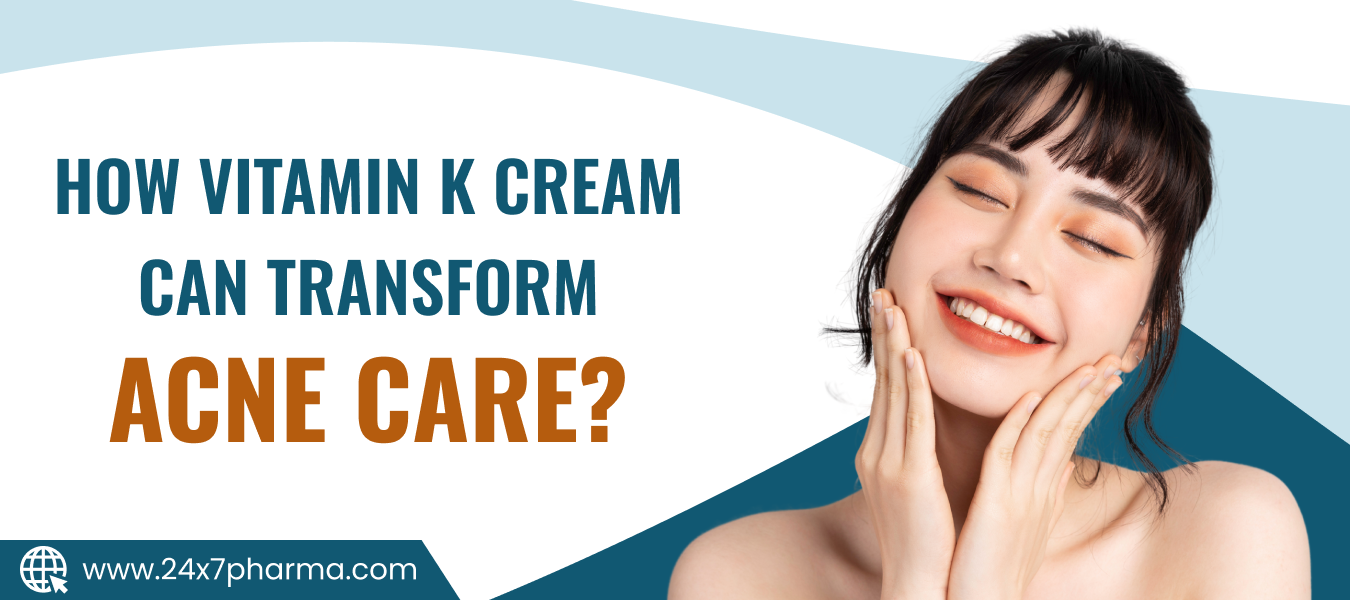Acne is one of the most common skin conditions that affects people of all ages. While numerous treatments promise clear skin, many overlook a lesser-known yet powerful skincare ally: Vitamin K cream. This unassuming product has been making waves in the beauty and dermatology world for its ability to support healing and improve overall skin health. Here’s how it works and why you should consider adding it to your acne care routine.
What Is Vitamin K?
Vitamin K is a fat-soluble vitamin essential for various bodily functions, including blood clotting and wound healing. It occurs naturally in foods like leafy greens, broccoli, and certain oils, but it can also be applied topically. When used in skincare, Vitamin K is lauded for its ability to promote skin recovery and reduce redness, making it a prime candidate for acne care.
How Does Vitamin K Cream Work?
The magic of Vitamin K in cream lies in its ability to support skin health at the vascular level. When applied to the skin, Vitamin K helps strengthen blood vessels and promote proper blood flow. This property is particularly helpful for addressing:
- Acne-related redness and irritation: By soothing inflammation, Vitamin K cream can calm angry, red blemishes.
- Bruising and discoloration: Known as an effective Vitamin K cream for bruises, it can help fade the dark marks left behind by acne.
- Post-inflammatory hyperpigmentation (PIH): Vitamin K cream encourages skin renewal, reducing the appearance of dark spots over time.
What Does Vitamin K Cream Do for Your Skin?
Vitamin K cream offers a variety of benefits for your skin, especially if you are struggling with acne or sensitive skin:
1. Reduces Redness and Irritation
Acne often comes with inflammation, leading to redness and discomfort. Vitamin K face cream soothes these symptoms by calming the skin and reducing vascular congestion.
2. Speeds up Healing
Whether you’re dealing with popped pimples, bruises, or skin irritation, Vitamin K cream benefits include enhanced healing. Its ability to regulate blood flow accelerates the recovery process, making it an excellent post-treatment option.
3. Lightens Dark Spots and Scars
Dark spots, scars, and post-inflammatory hyperpigmentation can linger long after acne has cleared. Vitamin K skin cream gently lightens these marks, improving overall skin tone.
4. Minimizes Bruising and Capillary Damage
For acne-prone individuals who experience bruising from extractions or harsh treatments, Vitamin K cream for bruises can minimize the appearance of those marks.
5. Nourishes and Strengthens the Skin
In addition to its targeted effects, Vitamin K creams improve overall skin health by strengthening the skin’s barrier and boosting hydration.
How to Use Vitamin K Cream for Acne Care?
Incorporating Vitamin K cream into your skincare routine is simple, but using it correctly can maximize its benefits:
- Cleanse Your Skin: Start with a gentle cleanser to remove dirt and oil.
- Apply the Cream: Take a small amount of Vitamin K face cream and gently massage it onto the affected areas. Focus on areas with redness, dark spots, or irritation.
- Follow with Moisturizer: For optimal results, seal the Vitamin K cream with a lightweight, non-comedogenic moisturizer.
- Use Consistently: Apply Vitamin K cream once or twice daily for the best results. Regular use ensures consistent benefits.
Pro Tip:
For those using active acne treatments like retinoids or acids, apply Vitamin K skin cream as a complementary product to soothe irritation and enhance healing.
Benefits of Vitamin K Cream for Acne Care
Acne care requires a combination of treatments to target inflammation, healing, and discoloration. Here’s why Vitamin K cream stands out:
- Natural Skin Brightener: It helps lighten post-acne dark spots and hyperpigmentation without harsh chemicals.
- Reduces Scarring: By supporting your skin’s repair process, Vitamin K in cream form minimizes the appearance of scars over time.
- Calms Active Breakouts: Its anti-inflammatory properties soothe red, inflamed pimples, making it a gentle yet effective option for sensitive skin.
- Complements Other Treatments: Whether you’re using salicylic acid, benzoyl peroxide, or retinoids, Vitamin K skin cream can be a supportive addition, balancing their harsher effects.
Side Effects
While Vitamin K cream is generally safe and gentle, some individuals may experience mild side effects, such as:
- Temporary redness or itching: This may occur if the cream is applied to broken or overly sensitive skin.
- Allergic reactions: Always perform a patch test before introducing a new product.
If you have very sensitive skin or are prone to allergies, consult a dermatologist before adding Vitamin K cream to your routine.
What is Vitamin K Good For?
In summary, Vitamin K cream is good for addressing a wide range of skin concerns, including:
- Acne-related redness and discoloration
- Bruising from extractions or injuries
- Dark circles under the eyes
- Post-inflammatory hyperpigmentation
- Enhancing overall skin healing
Its versatility makes it a great addition to any acne care regimen, offering gentle yet effective results without the harshness of traditional acne treatments.

